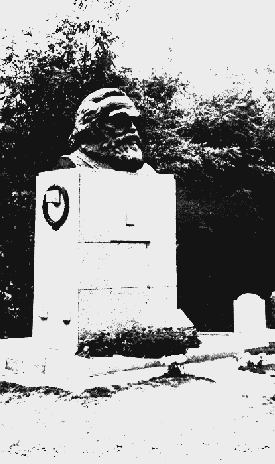Leon Trotsky
Wednesday, 13 June 2012
The Young Turks
Sunday, 10 June 2012
Frederick Engels’ Speech at the Grave of Karl Marx

"A disproportionate number of Alawis owe their livelihood to the regime. To fight for a post-regime future means to fight for a future in which their community will be, at best, less favoured than at present."
Most of the debate about Syria is about what people should do, very little is about why they do what they do. At least the above is a start. A hundred and thirty years ago at his friend's funeral, Frederick Engels said he thought his friend had discerned the primary cause:
Do the Syrian bourgeoisie and state officials support the regime because they are wrong-headed, or because they benefit from it? Will the lower-level state functionaries be won away from it by being told they'll get a smaller slice of the same cake, or that the cake will be bigger once the parasites stop creaming off the top? If the latter are there irreconcilable interests of those who wish to profit from Syria in the future and those who would have to labour to produce those profits?
How to overthrow the regime is another question. The working class has the power (in Russia in 1917 it was 2% of the population, I'm sure in Syria it is much higher), but for understandable reasons socialist politics there have been corrupted by Stalinist backers of the status quo. But still the question arises of who else will control any force capable of knocking the regime over; if that is foreign intervention they will impose their own idea of what is good for Syrians, replicating as far as they can the system of exploitation in their own country, whether that is Turkey, Saudi Arabia or the US. And if it is the FSA uncontrolled by the grassroots, then the best that can be hoped for is some sort of military Bonapartism.
Similar questions arise as to how a post-Assad Syria is to be constructed. Is it simply to be a similar scheme of exploitation, with the Assad family removed and perhaps the facade of a Western-approved democracy, in which those with power and influence compete in elections to show the limited amount they are prepared to share with their own constituencies, while sharing the rest with their corporate friends at home and abroad, à la Iraq?
How to overthrow the regime is another question. The working class has the power (in Russia in 1917 it was 2% of the population, I'm sure in Syria it is much higher), but for understandable reasons socialist politics there have been corrupted by Stalinist backers of the status quo. But still the question arises of who else will control any force capable of knocking the regime over; if that is foreign intervention they will impose their own idea of what is good for Syrians, replicating as far as they can the system of exploitation in their own country, whether that is Turkey, Saudi Arabia or the US. And if it is the FSA uncontrolled by the grassroots, then the best that can be hoped for is some sort of military Bonapartism.
Similar questions arise as to how a post-Assad Syria is to be constructed. Is it simply to be a similar scheme of exploitation, with the Assad family removed and perhaps the facade of a Western-approved democracy, in which those with power and influence compete in elections to show the limited amount they are prepared to share with their own constituencies, while sharing the rest with their corporate friends at home and abroad, à la Iraq?
These are the sort of questions that should have been asked by John Rees in this dreadful article,http://www.counterfire.org/…/15821-syria-the-left-and-a-rev…. But this supposed dialectician instead sets up a false pro/anti -intervention dialectic, in which the Syrians who don't support intervention supposedly see those who do as a bigger enemy than the regime. To which any anti-regime Syrian will reasonably tell him that he knows nothing and understands less, if they were to be more polite than he deserves.
Subscribe to:
Comments (Atom)